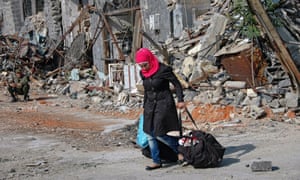
'When I chaired an English PEN committee that campaigned on behalf of imprisoned writers, I heard first-hand about the torture that went on in the country’s prisons. One of the most notorious jails was close to Palmyra, where opponents of the government had their joints ripped apart on a horrific instrument of torture called the “German chair”. I used to wonder what would happen when decades of this brutal repression became intolerable and ordinary Syrians rose against Assad.
The answer turned out to be an extraordinarily savage civil war. It is a story that encompasses a massive refugee crisis and a whole series of war crimes, including rape of the regime’s opponents, male and female alike, and the use of chemical weapons. Now Russia’s entry into the conflict appears to have turned the odds in President Assad’s favour, while causing significant civilian casualties.
What life is like for ordinary Syrians who have stayed behind is the subject of Janine di Giovanni’s heartbreaking book.
A young woman called Nada, who carried medical supplies to opposition fighters and broadcast reports calling for a democratic Syria, describes how she received a panicked phone call from a friend, telling her he had been arrested. “Can you get here right away?” he begged. “They want to talk to you, too.”
It was a pre-arranged signal, giving Nada time to run, but she had nowhere to go. She destroyed anything that might incriminate her, but it made no difference when the knock came in the early morning, two days later. Nada spent the next eight months being tortured and made to listen as other prisoners were stripped, beaten and forced to drink urine. She was also raped, something confirmed by one of her friends, although Nada herself is unable to talk about it.
Di Giovanni confronts the nightmarish subject of sexual violence as a means of terrorising prisoners early in this extremely harrowing book. Her account of rapes in Assad’s prisons is unsensational but unsparing, a tone she maintains when she meets Hussein, a student. Hussein was never a fighter but that didn’t stop him being arrested and his story about being tortured by men who described themselves as doctors is too graphic to repeat. He survived only because another doctor took pity on him, certifying him dead so he would be taken to the morgue, where a nurse helped him escape.'
No comments:
Post a Comment